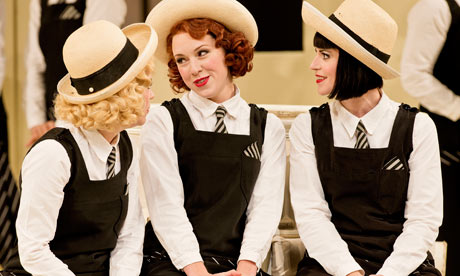
There's always a danger, when a production has turned into a venerable institution, of the whole enterprise settling into a comfy chair of an evening, capably but somewhat dutifully re-upholstered. ENO's latest revival of Jonathan Miller's 1986 staging of the Gilbert and Sullivan classic neatly sidesteps that artistic pothole, remaining bright and sharp; in particular, Anthony van Laast's choreography, here revived by Stephen Speed, is attacked with a brilliance and precision not always attained in previous incarnations.
Richard Suart's Ko-Ko has been the centrepiece of this production for a staggering 25 years. Finely honed, while fitted out with all manner of baroque eccentricities, his craven tailor-turned lord high executioner is a masterpiece of theatrical comedy. Once again, his little list of notable individuals without whom society would be significantly better off, skewers a host of newsroom celebrities with gleefully dyspeptic malice.
Surrounding him are other classy performances, some of them freshly minted. Mary Bevan sings Yum-Yum immaculately and with a knowing self-regard that retains a charmingly innocent surface. She's aided and abetted by Fiona Canfield and Rachael Lloyd as the other two of the three little maids, whose collective irreverence wipes the sneer off the face of Donald Maxwell's status-conscious Pooh-Bah.
Robert Murray's nice but dim Nanki-Poo sings an appealing lyric line, while Yvonne Howard's grand Katisha steers a carefully charted course between mezzo man-eater and woman scorned, revealing the sympathy in Sullivan's music that Gilbert's mockery largely denies her. Another old campaigner, Richard Angas's Mikado makes his mark with his song celebrating his punitive policies and lip-smacking anticipation of the most gruesome forms of execution.
Things get off to a good start with conductor David Parry's punctilious account of the overture; bolstered by his vital handling of the score throughout, the pace never really lets up.
• What have you been to see lately? Tell us about it on Twitter using #GdnGig

